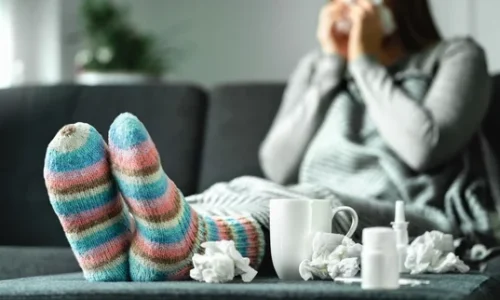- Judith Akatugba
- 0 Comments
- 685 Views
Catching a cold never feels good, what with the restless nights and general weariness. Furthermore, colds usually seem to catch people off guard—for example, right before a trip, a birthday, or the holidays.
According to Dr. Delana Wardlaw, a family care physician at Temple Health in Philadelphia, colds are caused by upper respiratory viruses that are transferred through droplets formed when someone coughs or sneezes. Thus, Wardlaw explained, “people can get it by touching contaminated surfaces and putting their hands on their face or by coming into contact with others who are sick.”
Read Also: How to Prepare Banga Soup (Palm Nut Soup)
By now, you’re probably very familiar with colds; they occur frequently. In fact, according to Dr. Richard Chung, an expert in adolescent health at Duke Health in North Carolina, they are the most prevalent acute disease in the country.
“Even though it is usually not serious, it is a big problem that causes a lot of disruption in homes, offices, and schools,” Chung emailed HuffPost.
Doctors, however, suggest there are strategies to avoid getting a cold. Here are some tips for maintaining your health.
1. Wash your hands.
It should go without saying that washing your hands is crucial to preventing the spread of any virus, including COVID-19, norovirus, and the common cold, especially after a multiyear pandemic.
“Viruses are spread through droplets delivered through sneezing, coughing, or other close contact, as well as touch—person-to-person or a person touching things that may carry the illness on their surfaces,” according to Chung.
According to Chung, viruses can linger on skin for a few hours and on other surfaces for a number of hours.
He pointed out that this makes cleaning your hands a crucial part of avoiding infection. Washing your hands with soap and water for 20 seconds is the proper handwashing technique.
2. Disinfect high-touch surfaces.
When an infected person comes into contact with door handles, light switches, or cell phones, these surfaces can become contaminated with cold virus droplets.
According to Chung, “decontaminating high-touch surfaces in shared areas can also be helpful.”
3. Get lots of sleep and practice other smart habits.
“Our goal is to promote healthy habits among individuals by ensuring that they are getting enough sleep, eating a balanced diet, and managing any underlying medical conditions,” Wardlaw told reporters.
According to Wardlaw, the likelihood of having a cold lowers when your general health is better. She added that maintaining a healthy diet, getting regular exercise, and getting enough sleep are all important aspects of basic self-care.
4. Consider wearing a mask.
“We live in a time when masks are worn frequently,” Wardlaw said, adding that they shield users from COVID-19 infections in addition to other viruses. For instance, the number of flu cases dropped a few years ago when mask requirements were implemented.
The Centers for Disease Control and Prevention also state that you can shield others around you from respiratory infections by donning a high-quality mask, such as a N95 or KN95.
5. Avoid crowded spaces.
It’s a good idea to stay away from crowded, indoor areas in the days leading up to a large celebration or trip in order to lower your chance of getting sick.
According to Chung, “exposure to more people who may be infected, especially in close quarters, may increase risk of infection.”
Once more, this is something that a lot of people discovered early in the epidemic when it was advised—and continues to be—to spend time in open, well-ventilated outside settings rather than congested interior ones.
Though doctors claim there isn’t enough evidence to support them, you can take supplements like zinc.
“A lot of other products people commonly use to try and prevent colds, like probiotics, vitamin C or D supplementation, or zinc sulfate, really don’t have strong evidence to support them,” Chung said.
The information is inconsistent. Overall, research has not demonstrated that zinc shields against colds. Furthermore, according to the Mayo Clinic, while some research suggests that zinc helps shorten the duration of illness, other studies do not support this claim.
The Cleveland Clinic states that the same is true for vitamin C: longer periods of illness were seen in certain studies, but not in others, and those who took extra vitamin C did not experience a reduction in colds.
Thus, while taking vitamins might assist with your cold, their effectiveness isn’t assured. Consult your physician before attempting any new diet or supplement regimen. Excessive consumption of some supplements, such as zinc, vitamin C, or vitamin D, should also be avoided.
“Magical medications don’t exist,” Wardlaw declared. “A cold will pass; it does not require the use of specific medication to treat it.” Although certain over-the-counter drugs may provide momentary symptom relief, they are not a treatment.
Furthermore, Wardlaw stated, “You do not need antibiotics—antibiotics treat bacteria, not viruses, which is what the common cold is.”
Consult your physician if your condition worsens.
While colds are incredibly frequent and usually self-limiting, Chung added that other, more serious health issues are also rather common and occasionally require for medical attention.
Breathlessness and a fever of 102.2 degrees or above are concerning indications, he noted.
In these situations, Chung advised, “don’t be afraid to contact your healthcare provider and get checked out, especially if you are more susceptible to complications because of your age or underlying medical conditions.”
However, most people’s colds won’t get any worse. Rather, things will proceed as planned, and you will ultimately emerge on the other side.











